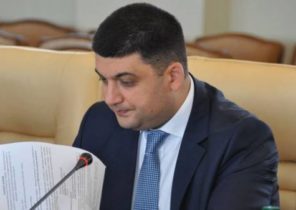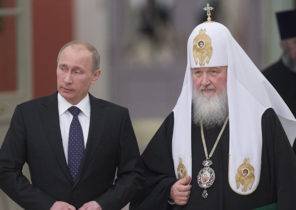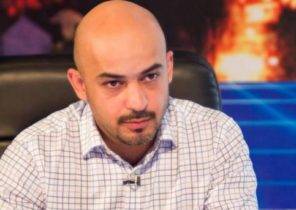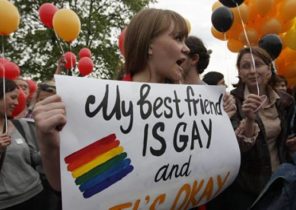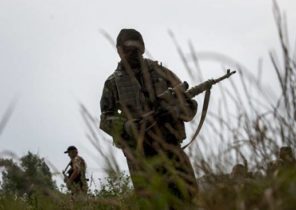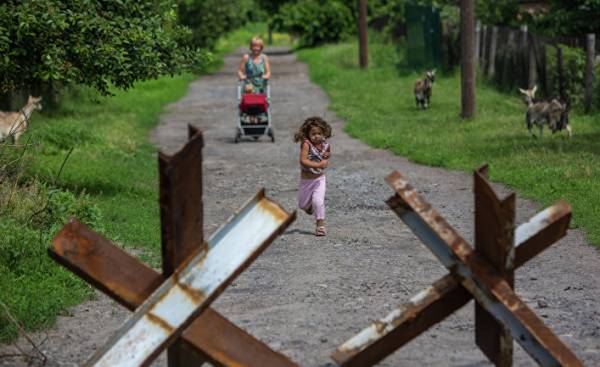
Slavyansk — on Monday, a group of teenagers gathered at the public library of Slavyansk, located in the East of Ukraine, 50 km from the front line, to learn more about life in America.
The day America celebrated presidents ‘ day, and to practice English, Teens gathered in the library, wrote letters to the President of the United States Donald Trump.
“Thank you for everything — wrote to the President of the girl named Kate. I want to visit America and the world without war. Help Ukraine.”
This event conducted by a volunteer named Olesya — she asked me not to call her name, for security reasons. She radiated boundless energy and enthusiasm, explaining to teenagers how to make conversation in English and helping them with tasks.
“I want my children, 10-year-old Milena and 4-year-old Maria, and all the children of the East of Ukraine to forgive and forget the horrors that they had a chance to see, — said Olesya in an interview with The Daily Signal. They already took their share of misfortunes. They are more than enough. I’m sure this generation was born to change Ukraine. They simply have no other choice”.
These teenagers, whose age varies from 13 to 15 years, are members of the group called Access in Sloviansk, which meets several times a week to learn English and American culture. Club Access in Sloviansk was one of the few programs in the cultural-information center “Window on America”, working at the library of Slavyansk. The age of the participants of the various programmes of this centre varies from 5 to 60 years.
On the wall in the library next to posters depicting the Statue of Liberty and new York city, hangs an American flag. On the shelves are books on the history and geography of America as well as tutorials for test preparation, guidance for submitting applications for admission to colleges in the US and a DVD collection of movies about rocky Balboa.
“This war has affected everyone, but all people react and recover differently,” said Darina Andreeva, coordinator of the program “Window on America” in Slavyansk.
“People find it difficult to quickly recover from this shock and begin to move on, but I’m happy to see that many young people are optimistic about the future, — said Andreev. — They are curious, they enjoy learning new things. I am happy to work in this center because I have the opportunity to support their passionate enthusiasm”.
In April 2014, Pro-Russian separatists, backed by Russian special forces and agents of Russian security services seized the Slavyansk. In July 2014, Ukrainian forces began an operation to liberate this town with a population of about 100 thousand people. While the city was hit by artillery and tank shells, and in the streets of Slavyansk shots were fired from small-caliber weapons, Olesya decided that the cycle of violence that engulfed all Ukrainians must stop.
“12 APR 2014, my little world changed forever, she stated, naming the date of the capture of the city by the separatists. — The war has not destroyed me, she taught me compassion and to appreciate every moment of life. Now it was my turn to help my neighbors — University students, young people from the circle of Access, Slavyansk residents — to give them strength, encourage them, to teach them to speak English.”
29 centers “Window on America” in Ukraine represent a diplomatic project, organized by the Embassy of the United States to “strengthen mutual understanding between the USA and Ukraine”, as reported on the official website of this program.
However, the “Window on America” in Slavyansk is a first initiative from below, backed by local residents. The Slavic center is actually a transplanted version of the program “Window on America” that existed in Donetsk before 2014, separatist forces captured the city. Today Donetsk is the capital of one of the two separatist regions in the East of Ukraine.
“Not all of them are dreaming about America, says Andreyev, referring to adolescents. Some of them dream to live in Australia or in Germany. But they are United by the center and the desire to learn English, to learn something new. In such a small city like Slavyansk, it is a very good cultural center.”
The return to work
Later in an industrial area on the outskirts of Slavyansk Alexander Polegenko opened a heavy metal door in one of its two factories for the production of ceramic ware. Inside in the air flying many particles of clay, the clubs raised over machines that were managed by two workers. It seemed that the workers did not even notice the arrival of his boss.
Shapeless mass of gray clay oozed from one machine, like a giant worm. With the help of wire work, and cut it into blocks about the size of a phone book. Then these blocks were attached to the form, and they were sent to the workshop of fine ceramics in another part of the factory.
That night a spacious room of the factory with a high ceiling was brightly lit and filled with rumbling machines. Usually a day window factory open wide open to of the dust out, as explained Polygenic. But night workers prefer to wear masks in order not to open the Windows and keep out cold air inside. If you have been to Ukraine in winter, you will understand why they do it.
Polygenic, laid down their arms and spread shoulders, proudly surveyed the fruits of 15 years of hard work. Two of its factories in Slavyansk produce about 650 thousand pieces of pottery in a month. They employ 260 people including veterans and 22 Ukrainians who had to leave their homes because of the war. The third factory, the construction of which is nearing completion, will have another 150 people.
“My dream is to expand his business to America itself, says Polygenic. — The war will soon end and we must now look to the future”.
Polygenic clean — shaven with short-cropped graying hair and a round, lively eyes, is the owner of the trademark “Polygenic”, one of the largest manufacturers of ceramic ware in Ukraine.
Polygenic created his own company 15 years ago. Today it is one of the most important enterprises Slavyansk. But success did not come immediately. To build the company, Polienko had to find ways to survive in the corrupt, post-Soviet business environment of Ukraine, teeming with thugs of the mafia demanding tribute oligarchs and Russian agents. And don’t forget about the war.
“After the revolution in Ukraine has become easier to do business, but if will return to the era of Yanukovych, I can’t work,” said Polygenic, referring to the former Pro-Russian Ukrainian President Viktor Yanukovych, who lost his post as a result of the Pro-European protests 2014.
According to Polygenic, he and his family was forced five times to leave Sloviansk because of the war and because of threats from criminal groups. “I know what war is”, he added.
Corruption, albeit rather slowly, weaker in Ukraine — as Russia’s influence. The economy is also gradually recovering after the shocks that she experienced after the revolution and the loss of the Crimea, and after three years of war.
In 2016 Ukraine’s GDP grew by 1%, and, according to various Ukrainian and international experts, from 2017 to 2019, the country’s GDP will grow by about 2.3% per year.
Polygenic optimism that the business environment in Ukraine is changing in the right direction and that the war will end soon. All this gives him the opportunity to seek ways of expanding its business outside Ukraine.
With great enthusiasm Polygenic talks about his dream to build his own factory in the United States. However, while he tries to find ways to begin to export its products to the American market.
“We are not looking for investors we looking for business partners,” he said.
Role models
In 2014, Slavyansk has been the epicenter of the separatist movement, which, with financial and military support from Moscow resulted in the formation of the two separatist republics in the East of Ukraine.
In the spring of 2014 in Eastern Ukraine was sent Ukrainian troops to stop the advance of Russian-separatist forces, who at the time were captured one city after another around the Donbass — industrial area in the South-East of Ukraine, bordering Russia.
Separatist forces took Slavyansk in April 2014. How to tell the people who lived in the city at the moment in the ranks of the separatists were a lot of soldiers of Russian special forces and agents of Russian security services. However, the Kremlin has continued to deny the fact that he supported the separatists.
July 5, 2014, after several weeks of fierce battles, Ukrainian troops finally retook Slavyansk. Of course, it was not a Pyrrhic victory, but the battle for the liberation of the city has left very visible scars: the nearby village of Semenivka artillery shells almost leveled. In the fighting killed about 100 people, and approximately 40% of the inhabitants of the city fled.
In August 2014, a month after the battle, the wreckage of the hull of the separatists, triggering a mine were scattered along the road leading to the city. The walls were covered with traces from bullets and shrapnel of artillery shells. Destroyed artillery shell bus stop on the suitcase sat a woman and her son waiting for when some kind of machine they ride. In Semenovka gradually returned to its inhabitants, fleeing from the shelling, they turned their home into a pile of rubble.
Today in Slavyansk at peace. People returned to their homes, and most of the external damage had been repaired. The face of the city changed too. Evidence of Pro-Ukrainian sentiment is much more visible than a hidden Pro-Russian bias.
Statues of the Soviet leaders, including Vladimir Lenin, were demolished. Everywhere you can see the Ukrainian yellow-blue flags, and on the walls you can often find the inscription “Glory to Ukraine!” — the Ukrainian equivalent of the American “God bless America!”
But the war is not over. Daily skirmishes continued at the front line, located just 50 kilometers from Slavyansk.
The parties signed the agreement on cease-fire in September 2014 in the capital of Belarus, Minsk, but the truce quickly collapsed. Was later signed another agreement, called Minsk-2, which allowed to reduce the intensity of hostilities, forbidding planes and heavy guns within the buffer zone around the front lines.
But war never ceased. It turned into static, indirect military conflict that was fought from trenches and makeshift fortresses located along the 400-kilometer front line.
The third of those 10 thousand people who died in the Ukrainian conflict, was killed after the signing of the peace agreement of February 2015. Still, both sides continue to die every day people, both military and civilians. And about 1.7 million Ukrainians actually remain refugees in their own country.
At times the intensity of the fighting increases, as happened in January in the town, located at the front line. However, the cease-fire allows for the most part to keep the war under control, and for the last two years the two sides have not made any serious offensive operations.
Hope
Members of the group Access in Sloviansk started the event in honor of the day of the presidential in the US the song in English.
They stood at the tables, placed the letter P surrounded by the author of this article and his brother, who was invited to speak at the event. Over the last two years it was the second event of the Slavic center “Window on America”, which was attended by citizens of the United States.
First, the teenagers were shy, though behaved politely pointed out. They raised their hands before speaking. Most of them had smartphones, but demonstrating a level of politeness and good breeding, which is not always possible to observe the American students — they didn’t have it in hand in those moments when someone spoke.
But in the end, they still got their smartphones to take some photos.
During the conversation, when we asked Teens to name their favorite characters are America, we are surprised to hear very different and unexpected answers from the monument to Thomas Jefferson in Washington and Chicago restaurants McDonald’s, Hollywood, baseball and pizza (Italy, sorry).
When we asked them to name my favourite American President, they replied that it was Abraham Lincoln, Ronald Reagan and John F. Kennedy.
During our conversation, we gradually moved from tables to bean bags. Adolescents gradually settled and began to open up. They talked about their Hobbies such as playing guitar and football and about their favorite movies, such as “home Alone” and “the Avengers”.
They had a lot of questions about life in America.
“What kind of music do you like?— they asked. — What is your favorite holiday? What sport do you do?”
And then: “is it True that in America you can live where you want?”
Ukraine needs to go through the rather tedious procedure of re-registration if the person wants to change the city of residence. Ukrainians are still obliged to carry an internal passport — a relic of Soviet times, when a person could at any time be asked to produce documents.
Therefore, these teenagers find it difficult to understand how it is possible at any time to move from one city to another.
Towards the end of the meeting, Andreev, coordinator of “Window to America”, they asked: “could you explain to them what it means to the American dream?”
We thought for a moment to formulate a clear answer from this, much depended.
“It’s the belief that anything is possible and that, whatever it was, you always have the option to choose to make their lives better,’ I said. — No matter where you are, which you environment and family, you are responsible for your life.”
“Awesome,” said one of the girls.
“But it can be called Ukrainian dream, — said Olesya, the head of the circle. — You can do what you want. Remember what I told you. You — a different generation. Your life will be different”.
Labor discipline
In his office at the factory for the production of ceramic ware, Polygenic leaned his elbows on the table. “You have to believe in his work, he said. Then everything will be possible”.
The office walls were covered Polygenic military memorabilia: flags signed by soldiers, medals, photos. Pieces of shells of various calibre were laid out on his Desk, in a drawer of which he keeps a grenade. “Just in case”, he said.
“Tea, coffee?” asked Polygenic in the beginning of the interview.
A few minutes later his Secretary appeared with a tray, on which stood cups of hot tea and coffee and plates of chocolate, biscuits and sweets. Polygenic knows how to make a good impression.
Polegenko very ambitious, and he constantly talked about plans to expand his business in America. Together with his teenage daughter and adult son, who helped him with the translation, he spoke about how he understands the idea of labor discipline.
“If you work from eight in the morning until 6 PM — that’s not enough, then have to start from six in the morning,” he said.
Polegenko some time talked about his business, but he noticeably perked up when talking about the Ukrainian soldiers. He praised the courage the soldiers showed in the battles he had seen it with my own eyes when they fought for the liberation of Slavyansk in 2014.
“The quieter soldiers, so it is dangerous”, he added.
On your computer Polygenic showed photos taken in various volunteer projects, which he led to support the Ukrainian army. Within three years, while the war went on, he often traveled to the front lines, bringing with them food, and camouflaged containers for storage of ammunition.
Polegenko also paid for the production of the medals for the soldiers who received them for their courage in battle. “Who will help the soldiers, if not I?”
Name Polygenic known to many soldiers on the front line due to one subject.
In their factories, he produces a distinctive yellow-and-blue Cup, which depicts the national symbol of Ukraine, a Trident, and a mustachioed Cossack the terrible.
“It’s to support morale,” explained Polygenic.
The armed forces of Ukraine greatly strengthened, both in terms of security and in terms of military skill, in comparison with the first days of the war, when the rapid advance of the Russian-separatist forces in the Donbas took them by surprise.
Feeling the support of the Ukrainian army, the Ukrainian volunteer militias stopped the advance of the separatists and changed the course of the war in 2014. The composition of these militia consisted of civilians, who often lacked military training and armed with the simple weapons, sometimes borrowed from the local police. But by July 2014, the mostly volunteer army of Ukraine returned to the country 23 of the 36 districts seized by Russian forces and the separatists.
Later, these volunteer units were incorporated into the Ukrainian army and the National guard. And volunteers who put aside all their peaceful business in the early days of the war, to March against the enemy, now are the most experienced and battle-hardened soldiers of the Ukrainian armed forces.
Perhaps today, these people have a great history of standing up to tanks and artillery, as well as the conduct of trench warfare than any other group of soldiers of the regular army in the world.
“Now we have a real army,” said Polienko.
Ukrainians from different walks of life — from University students to businessmen who donated their money and time and risked their lives to support the struggle of his country against the enemy. Some decided to go to war, others involved in the collection and delivery of supplies to the front line.
Volunteers work without expecting any thanks or glory in return. They want to win the war, so that Ukraine can get back to normal life and begin to recover, becoming a democracy free of influence of Russia.
Perhaps the most impressive feature of the Ukrainian military movement was that it materialized without any support or guidelines from the government. It was truly a spontaneous manifestation of the Ukrainian society, demonstrated the tendency of Ukrainians to rely only on own forces, without waiting for any action from the government in time of crisis.
Thus, the volunteer movement in Ukraine has become the embodiment of a rupture with Soviet thinking — the disappearance of the so-called “homo sovieticus”, which used to rely on the government for their financial stability and security and did not want to because of apathy or fear of challenging the established order.
“Ukrainians are very important to help themselves without waiting for government action, said Polienko. — Now we need to end the war and get back to work”.
According to Polygenic, his business qualities and work discipline he was obliged to books and the internal core. He left the University without completing their studies, and at first was engaged in repair of TVs. “I had no education, he added. — I learned everything by myself”.
“You seem to have managed to embody the American dream,” I said.
There was a pause, while the son was translated into the Ukrainian language. And then Polygenic smiled.
“Now it was the Ukrainian dream,” he said.

